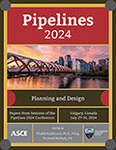Biaxial Loading of Jointed Thermoplastic Pipelines for Experimental Seismic Assessment
Publication: Pipelines 2024
ABSTRACT
The development of hazard resilient pipeline infrastructure has drastically evolved in recent years as a growing number of utilities look to improve the resilience of their water distribution systems that can be vulnerable to natural hazards. Pipelines are susceptible to damage from ground movements, such as fault ruptures, landslides, liquefaction-induced lateral spreading, and other large seismically-induced ground deformations. As municipalities and design engineers consider improved materials and jointing mechanisms, there is a need for the performance of these systems to be assessed through full-scale seismic testing. Although experimental testing has been conducted to evaluate the performance of pipeline response to some seismically representative loading conditions, many current methods deconstruct the soil–pipeline interactions into principally oriented mechanical responses. The loading mechanisms considered are limited to movement parallel and perpendicular to the pipeline axis (i.e., axial tension, axial compression, and transverse bending) and do not consider the effects of combined loading that occurs when the ground movement orientation is not aligned with an orthogonal plane of the pipeline. To better understand how combinations of loading affect a pipeline’s seismic performance, a biaxial testing procedure has been developed. This paper reports on a series of six full-scale pipeline tests performed at the University of Colorado Boulder’s Center for Infrastructure, Energy, and Space Testing laboratory. Experiments were performed on 6-in. (150-mm) diameter thermoplastic pipe (DR14) with an internal restraining gasket resisting pull-out of the bell-and-spigot joint. The results of this study illustrate how the transverse ground displacements and local effective system curvature affect the resulting axial capacity. These tests are intended to provide a framework for how a system may be assessed for seismic performance under combined biaxial loading. The presented procedures provide guidance relative to an ongoing ASCE/UESI committee on the Seismic Testing and Evaluation of Pipeline Systems (STEPS) as well as for seismically classifying axial response for the developing ASCE/UESI Manual of Practice (MOP) on Seismic Design of Water and Wastewater Pipelines.
Get full access to this chapter
View all available purchase options and get full access to this chapter.
REFERENCES
Berty, N. W. (2022). Seismic Assessment of Polyvinyl Chloride Pipe with Couplings. Boulder, CO: M.Sc. Thesis, University of Colorado Boulder.
Berty, N. W., B. P. Wham, C. R. Ihnotic, J. L. Ramos, and H.-R. Rose. (2022). “Seismic Performance Classification of Hazard Resilient iPVC Pipeline Systems.” Pipelines 2022, 232–241. Reston, VA: American Society of Civil Engineers.
Davis, C. A., S. Rajah, B. P. Wham, and W. F. Heubach. (2019). “Strain Demands on Buried Pipelines from Earthquake-Induced Ground Movements.” Pipelines 2019, 357–367. Reston, VA: American Society of Civil Engineers.
O’Rourke, T. D. (1998). “An overview of geotechnical and lifeline earthquake engineering.” cedb.asce.org.
Ramos, J. L. (2024). Seismic Evaluation Procedures and Biaxial Testing of Pipeline Systems. Boulder, CO: M.Sc. Thesis, University of Colorado Boulder.
Wham, B. P., B. A. Berger, C. Pariya-Ekkasut, T. D. O’Rourke, H. E. Stewart, T. K. Bond, and C. Argyrou. (2018). “Achieving Resilient Water Networks – Experimental Performance Evaluation.” Elev. U.S. Natl. Conf. Earthq. Eng., 11. Los Angeles, CA.
Wham, B. P., and C. A. Davis. (2019). “Buried Continuous and Segmented Pipelines Subjected to Longitudinal Permanent Ground Deformation.” J. Pipeline Syst. Eng. Pract., 10 (4): 04019036. American Society of Civil Engineers. https://doi.org/10.1061/(ASCE)PS.1949-1204.0000400.
Wham, B. P., C. R. Ihnotic, D. Balcells, and D. K. Anderson. (2019). “Performance Assessment of Pipeline System Seismic Response.” JWWA/WRF/CTWWA Water Syst. Seism. Conf. Los Angeles, CA: JWWA/WRF/CTWWA.
Wham, B. P., and T. D. O’Rourke. (2016). “Jointed Pipeline Response to Large Ground Deformation.” J. Pipeline Syst. Eng. Pract., 7 (1): 04015009. https://doi.org/10.1061/(ASCE)PS.1949-1204.0000207.
Information & Authors
Information
Published In
History
Published online: Aug 30, 2024
Authors
Metrics & Citations
Metrics
Citations
Download citation
If you have the appropriate software installed, you can download article citation data to the citation manager of your choice. Simply select your manager software from the list below and click Download.
